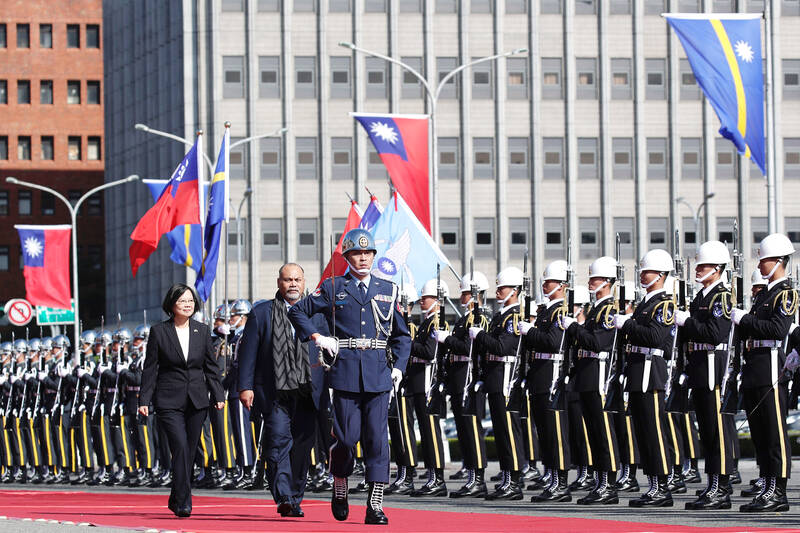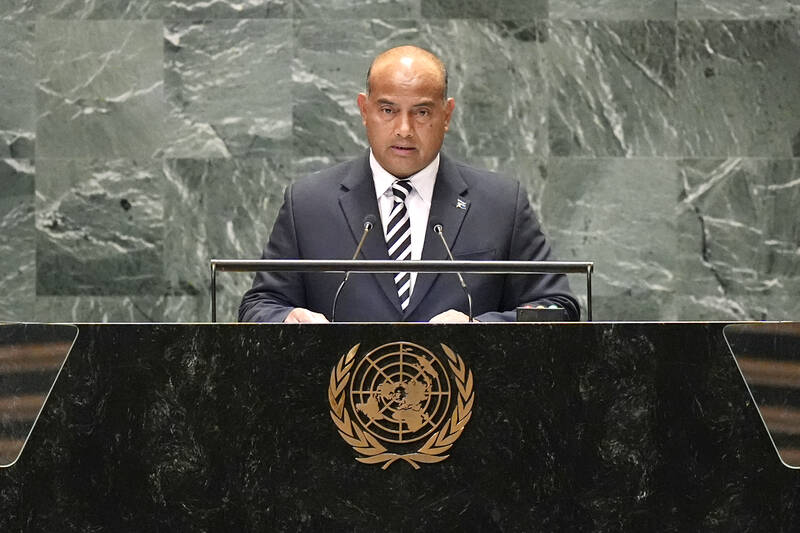To help meet the cost of moving about 10,000 residents from low-lying homes menaced by rising sea levels and floods, the remote Pacific Ocean nation of Nauru aims to sell citizenships for the climate-threatened island.
President David Adeang is seeking to raise an initial US$65 million for work to transform the barren interior — left as an uninhabitable moonscape by decades of phosphate mining — with a project to ultimately develop a new township, farms and workplaces. Around 90 percent of the population would eventually be relocated under the plan.
Foreigners paying at least US$140,500 for a passport will likely never step foot on the island nation, which lies around 4,000km northeast of Sydney, though can take advantage of visa-free access to destinations including the UK, Singapore and Hong Kong.

Photo: EPA-EFE
“While the world debates climate action, we must take proactive steps to secure our nation’s future,” Adeang, elected in 2023, said in a written response to questions. “We will not wait for the waves to wash away our homes and infrastructure.”
CLIMATE CHANGE
Nauru follows Dominica in aiming to use proceeds from citizenship sales to protect their populations from escalating impacts of climate change. It’s an illustration of the challenges small nations face in securing funding to deploy on initiatives to boost resilience. While rich economies have increased the rate of loans and grants to developing countries, the gap between available and required adaptation financing could be as much as US$359 billion a year, the UN Environment Program said in a November report.

Photo: AP
Negotiators for a bloc of small island states, including Nauru, at one point abruptly walked out of tense climate finance talks during last year’s COP29 summit in Azerbaijan, and an eventual deal — under which wealthy states pledged to deliver at least US$300 billion in annual support for climate action —fell far short of the more than US$1 trillion a year that had been sought.
Adaptation initiatives “require substantial financial resources which is an ongoing struggle,” Adeang told the UN General Assembly in New York last September. “When it comes to climate finance, we are too often relegated to the back of the queue.”
Between 2008 and 2022, Nauru received US$64 million in development financing that had a principal focus on addressing climate change, according to the Lowy Institute, a foreign affairs think tank.
Nauru faces significant increases in extreme flooding in the coming decades, according to NASA’s Sea Level Change Team. The number of flooding days — when water levels were at least 0.5 meters above a benchmark — totaled 8 between 1975 to 1984, and 146 between 2012 and 2021, the NASA data shows. Already, the estimated annual cost to small island developing states — a group of 39 nations that includes Jamaica and Fiji — from coastal flooding is more than US$1.6 billion a year.
A higher frequency of major floods threatens to overwhelm Nauru’s coastal population centers, government buildings, and the nation’s only airport — with a runway that’s adjacent to the ocean, said Alexei Trundle, associate director (international) at the Melbourne Centre for Cities, and who is helping Nauru develop a vulnerability assessment report.
Passport sales alone won’t fully cover the costs of Nauru’s Higher Ground Initiative, first outlined in 2019, and officials are exploring the potential to also win support from public and private sources. An initial A$102 million (US$65 million) phase is underway to free up about 10 hectares of land on the island’s so-called Topside, which was mined for phosphate — commonly used in fertilizer — for about a century from the early 1900s. Nauru gained independence in 1968.
“Demand for these sorts of programs is not going to go away,” said Kristin Surak, an associate professor of political sociology at the London School of Economics and Political Science, and author of The Golden Passport: Global Mobility for Millionaires.
It means it’s important there’s transparency “in terms of vetting and in terms of flows of money,” she said.

Three big changes have transformed the landscape of Taiwan’s local patronage factions: Increasing Democratic Progressive Party (DPP) involvement, rising new factions and the Chinese Nationalist Party’s (KMT) significantly weakened control. GREEN FACTIONS It is said that “south of the Zhuoshui River (濁水溪), there is no blue-green divide,” meaning that from Yunlin County south there is no difference between KMT and DPP politicians. This is not always true, but there is more than a grain of truth to it. Traditionally, DPP factions are viewed as national entities, with their primary function to secure plum positions in the party and government. This is not unusual

More than 75 years after the publication of Nineteen Eighty-Four, the Orwellian phrase “Big Brother is watching you” has become so familiar to most of the Taiwanese public that even those who haven’t read the novel recognize it. That phrase has now been given a new look by amateur translator Tsiu Ing-sing (周盈成), who recently completed the first full Taiwanese translation of George Orwell’s dystopian classic. Tsiu — who completed the nearly 160,000-word project in his spare time over four years — said his goal was to “prove it possible” that foreign literature could be rendered in Taiwanese. The translation is part of

Mongolian influencer Anudari Daarya looks effortlessly glamorous and carefree in her social media posts — but the classically trained pianist’s road to acceptance as a transgender artist has been anything but easy. She is one of a growing number of Mongolian LGBTQ youth challenging stereotypes and fighting for acceptance through media representation in the socially conservative country. LGBTQ Mongolians often hide their identities from their employers and colleagues for fear of discrimination, with a survey by the non-profit LGBT Centre Mongolia showing that only 20 percent of people felt comfortable coming out at work. Daarya, 25, said she has faced discrimination since she

The other day, a friend decided to playfully name our individual roles within the group: planner, emotional support, and so on. I was the fault-finder — or, as she put it, “the grumpy teenager” — who points out problems, but doesn’t suggest alternatives. She was only kidding around, but she struck at an insecurity I have: that I’m unacceptably, intolerably negative. My first instinct is to stress-test ideas for potential flaws. This critical tendency serves me well professionally, and feels true to who I am. If I don’t enjoy a film, for example, I don’t swallow my opinion. But I sometimes worry